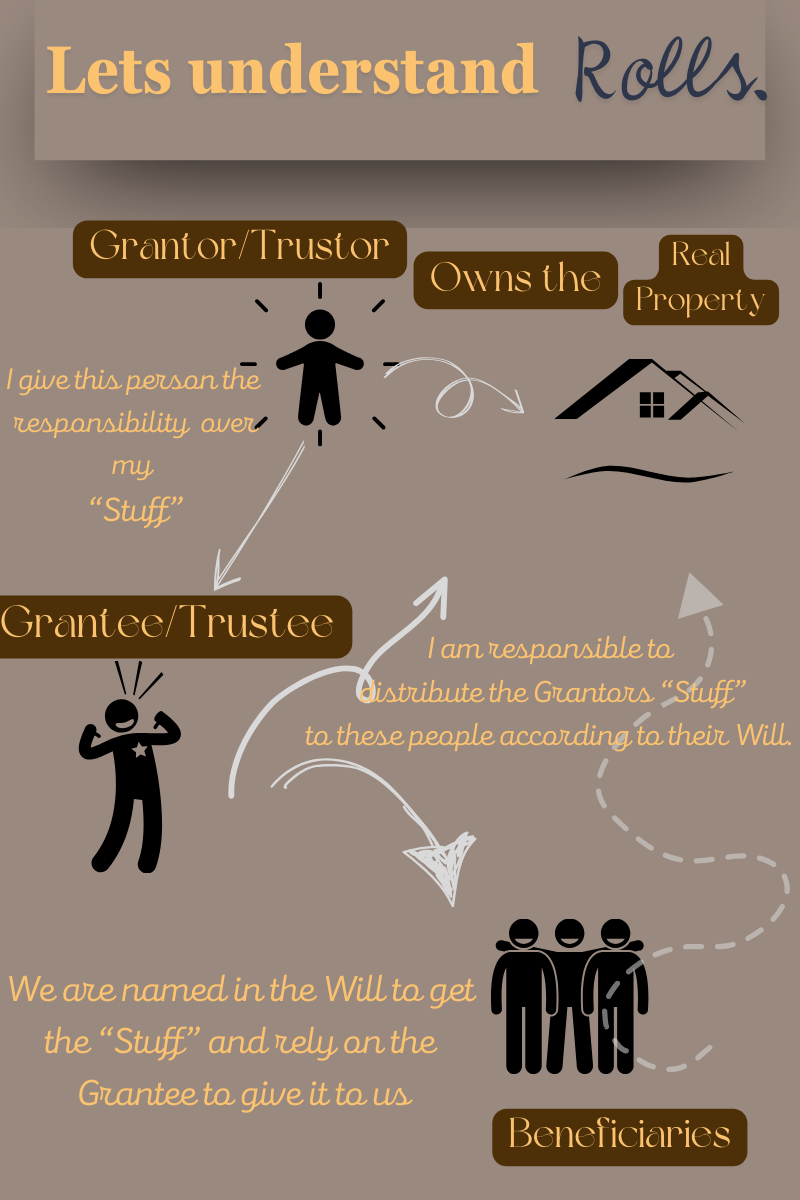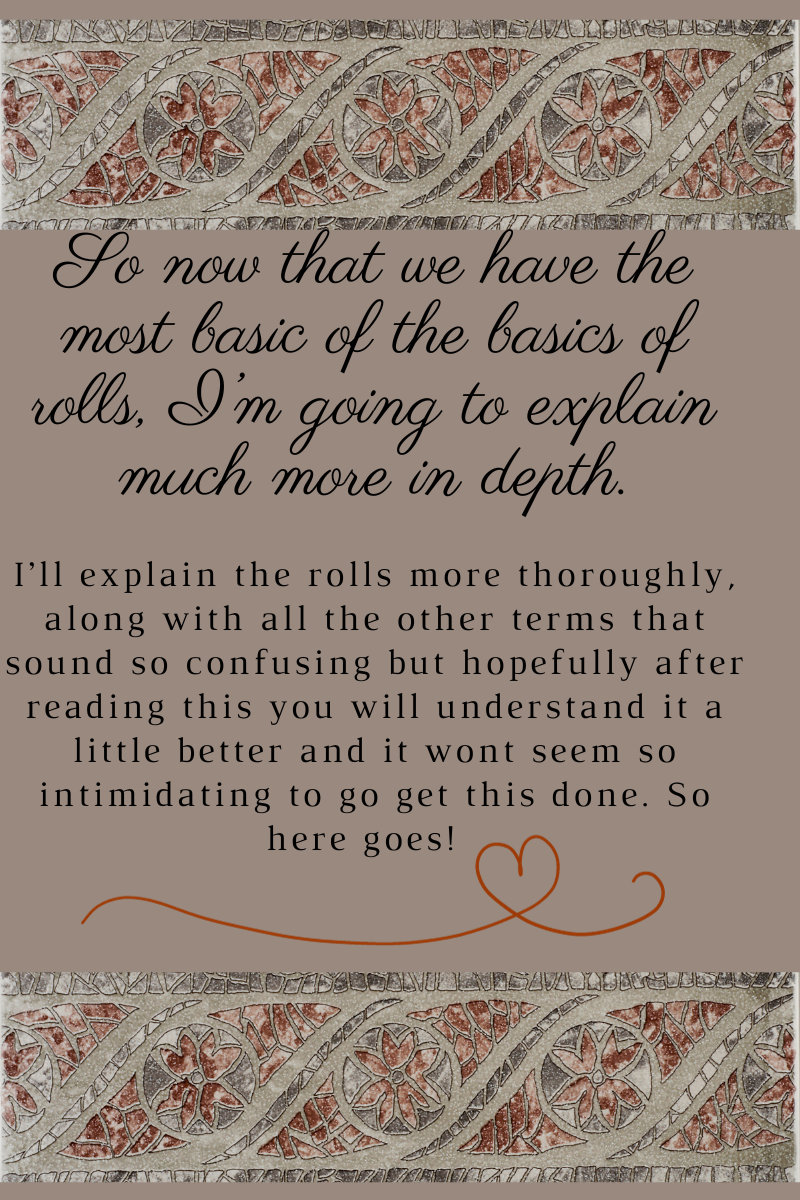



Now I'm going to define the important terms every person will hear when preparing their paperwork for their Trust, Estate Planning, and/or Will:
Let's get this part straight first, these first terms we are going to talk about are before death. These are especially important things to get taken care of before something happens to you, that way you know all your things such as property, bank accounts, belongings, anything you own, are taken care of. And most people only think up until death only but they don't actually think about the fact that other things could happen like having an accident and going into a coma, dementia, being incapacitated in anyway at all to where you can't make decisions for yourself anymore yet your still alive, if you don't have a plan in place, it can be very costly and time consuming going to court and hiring lawyers to figure it all out. So, this is where we talk about the Living Will.
- Trustor/Grantor: Parties who establish a Trust by transferring property to a
trustee to be managed for the benefit of another. - Trustee: The person or institution who is responsible for holding, managing, and distributing
money and other property contributed to the living Trust for 'the exclusive use and benefit of the beneficiaries. - Beneficiaries: One for whose benefit the living Trust is created and funded.
- Living Trust: A legal entity established by means of a written Trust instrument during the lifetime of the creator of the Trust. The terms of the Trust instrument govern the operation of the Trust and control of Trust property.
- Fiduciary: The obligation to manage assets in the same way a person would manage his own assets.
- Conservator: A person who has the legal duty to care for and maintain the person and/or
property of an incapacitated adult. - Probate: The legal proceedings by which the probate court is given full jurisdiction over the assets of the decedent. Probate starts with the filing of the decedent's will with the court and ends after all taxes and debts of the decedent have been paid and the assets accounted for distributed in accordance with the terms of the decedent's will. Probate usually lasts for at least nine months and can often endure for two years or more.
- Will: A legal document that communicates a person's final wishes pertaining to their assets. It provides specific instructions about what to do with their possessions. It will indicate whether the deceased leaves them to another person, a group, or wishes to donate them to charity.
- Estate: All the money and property owned by a particular person, especially at death.
- Executor: A person, bank, or trust company named in a will to administer a person's estate after their death. The executor's primary duty is to carry out the wishes of the deceased person based on instructions in their will or trust documents.
So, these are the most basic terms used to get started in explaining in what is a more complex process, but I am going to try my best to break it all down into pieces to hopefully make it a bit more understandable and make everyone realize how necessary it is to have a plan in place.
I have explained the several types of Power of Attorney's (POA) under my Notary service tab, so I won't go over the difference again here, but you will see the importance of having one in place.
3 Basic Rules of Estate Planning & Probate
- Probate Freezes an Estate. The probate court prevents the distribution of assets while it validates the will, and while the personal representative the Executor, notifies heirs and creditors, evaluates appraisals for the estate’s value, and pays taxes. While the appropriate heirs/beneficiaries will eventually receive their due share, the claims of creditors and tax authorities have priority on estate assets. Based on the rate of communication, efficiency of the court, and accessibility of any necessary documentation, the probate process can be lengthy. In the end, though, it is an important and necessary legal proceeding that helps prevent fraud. But it is highly dependent on a legal Will or Trust. The process for this will be left for another post so keep a look out for that information because there are ways to try to avoid Probate in Indiana.
- Not all Assets Require Probate. Without going into too much detail as I said before, I will write more on this later. Whether or not you have a will or trust established, there are certain assets that you may consider part of your estate which do not require probate. Whether or not an item undergoes probate usually depends on whether the item has been put into your documentation that says how ownership will be transferred after your death. So, setting up assets to your beneficiaries transfer automatically. Again, we will get to the nitty-gritty details of this later.
- Estate Planning Prepares for More than Death. Most people think of Estate planning, Trusts, and Wills only when it comes to death. That my friends it not the case. As it does play a crucial role, what you are essentially doing is putting a plan in place while you are still alive and capable of doing so of planning for your things, for your loved ones, and for their futures (and sanity). Nobody enjoys thinking about the fact that one day they may become incapacitated, not able to think for themselves, whether it be dementia, an accident, just about anything that has put you in a state that your brain isn't functioning like it should be, so legally you can't make decisions for yourself any longer. Even signing these types of legal documents in that state of mind would not be valid, so preparing them while your still in your prime and with a clear understanding of who you want to appoint to trust with your belongings to make the decisions you carefully outline, execute them as you outline them, distribute as you tell them to distribute them, know that they are going to take every precaution and responsibility to see that how you were taking care of your property, your money, your affairs, are being taken care of in the same manner you were doing so, is not something you would want to put off until you can't make that decision for yourself.
I hope so far you are seeing the importance so far of getting the ball rolling and not thinking that this process is just for your Grandma or Grandpa. It is for EVERYONE!
Please check back as this is only the first of many of my informational blogs on Estate Planning and Trusts- trying to break it down simple, since becoming a Certified Notary Trust Delivery Agent.


Add comment
Comments